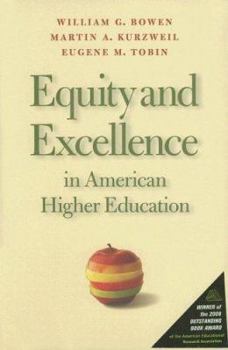Equity and Excellence in American Higher Education
Select Format
Select Condition 
Book Overview
Thomas Jefferson once stated that the foremost goal of American education must be to nurture the "natural aristocracy of talent and virtue." Although in many ways American higher education has fulfilled Jefferson?s vision by achieving a widespread level of excellence, it has not achieved the objective of equity implicit in Jefferson?s statement. In Equity and Excellence in American Higher Education , William G. Bowen, Martin A. Kurzweil, and Eugene M. Tobin explore the cause for this divide. Employing historical research, examination of the most recent social science and public policy scholarship, international comparisons, and detailed empirical analysis of rich new data, the authors study the intersection between "excellence" and "equity" objectives. Beginning with a time line tracing efforts to achieve equity and excellence in higher education from the American Revolution to the early Cold War years, this narrative reveals the halting, episodic progress in broadening access across the dividing lines of gender, race, religion, ethnicity, and socioeconomic status. The authors argue that despite our rhetoric of inclusiveness, a significant number of youth from poor families do not share equal access to America?s elite colleges and universities. While America has achieved the highest level of educational attainment of any country, it runs the risk of losing this position unless it can markedly improve the precollegiate preparation of students from racial minorities and lower-income families. After identifying the "equity" problem at the national level and studying nineteen selective colleges and universities, the authors propose a set of potential actions to be taken at federal, state, local, and institutional levels. With recommendations ranging from reform of the admissions process, to restructuring of federal financial aid and state support of public universities, to addressing the various precollegiate obstacles that disadvantaged students face at home and in school, the authors urge all selective colleges and universities to continue race-sensitive admissions policies, while urging the most selective (and privileged) institutions to enroll more well-qualified students from families with low socioeconomic status.
Format:Paperback
Language:English
ISBN:0813925576
ISBN13:9780813925578
Release Date:April 2006
Publisher:University of Virginia Press
Length:480 Pages
Weight:1.50 lbs.
Dimensions:1.2" x 6.1" x 9.2"
Grade Range:Postsecondary
Customer Reviews
1 rating
Great for graduate and some undergraduate work.
Published by Thriftbooks.com User , 17 years ago
I am busy so I will not fill you full of a bunch of reasons this book is so great because it was a bit thick to read start to finish. However, I found it nicely referenced and cross referenced on an assortment of topics current in the area of educational sociology. I was able to easily access what I needed and found it helpful for finishing up my undergraduate thesis work. I think if I pursue graduate level work on this topic that I will find many of the findings in this book quite helpful. The book was well cited and written in a natural and easy prose to read.I reccommend this book over the other thirty I read this semester.





